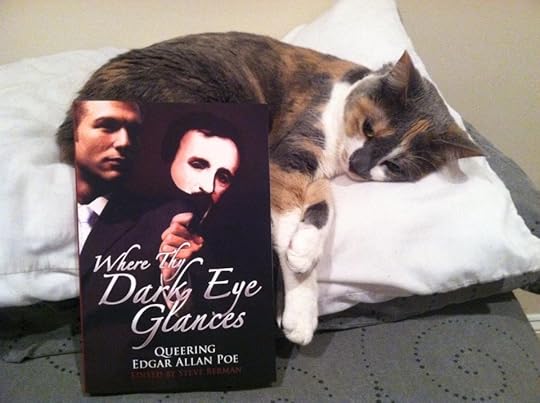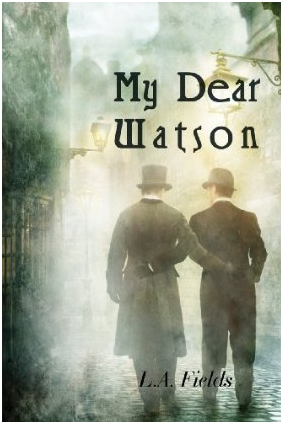L.A. Fields's Blog, page 7
June 25, 2013
Look over here.
Look at this cat. Look at this anthology. Look at me.
Pretty, isn't it? My story gaying up "The Fall of the House of Usher" is in there (called "The House of the Resonate Heart"). That's what you can do with an English degree, since you're so curious all the damn time.
Okay you're good, you can look away now.
June 13, 2013
Dys. Cover

Description of Dysfunction, by L.A. Fields:
Recent runaway Marley Kurtz is back home in Florida after a long road trip. He and his boyfriend Jesse get jobs, move into a loft above a mechanic’s garage, and start living the good life. They don’t stay free for long however; Marley is eventually pressured into reuniting with the family that sent him away. Far from being disowned, Marley soon finds himself pulled in too many directions at once.
Along with his sister, Lindsay, and his boss’s new foster son, Tristan, Marley must figure out what kind of family he’ll choose to call his own. Will it be the parents who raised and abandoned him, or the friends and adults in his life who have proven they really care? It should be an easy decision, but letting go is never easy.
June 9, 2013
Author Stuff

- Got an agent rejection for Loopholes, but my friend has offered to read it for me, so that's a thing too.
- I'll tell you what, grad school comments are about the same as reviews: what four people will hate someone else will find the one redeeming quality of the entire book and vice versa, it's weird. Interestingly: anyone who likes how I write but can't take Mrs. Watson narrating My Dear Watson: have I got all of my other books for you!
- Got some preliminary cover art for Dysfunction. Looks like it's destined to be even hotter than Maladaptation's, congrats to us all.
March 28, 2013
My Dear Watson - Author Copies
They're so pretty I could eat one of them (literally--blend it up and sneak it into my other food, I could do it). I've been reading random pages of the uncorrected proofs for a couple of weeks, and I'll be switching to the finalized version now, where of course any typos I can still find will fill me with a helpless rage. I would cut my own flesh once for every mistake to make it go away (also literally--this flesh is mortal, but this book is not; in fact I'd let someone else cut me, I'm that unconcerned with earthly pain).
Let's look at it one more time, knowing that the colors are richer in real life:

September 29, 2012
Interview with Keith Banner
My first online publication ("Walls") happened because I was following Keith's work around the internet, and "Exit Signs" happened because I couldn't not imitate him, so it's been really cool to ask him about his writing.
I'll post the questions here too, so that I can look at them here too.
I looked up the anthology where I first found “Holding Hands For Safety” (in Men on Men 7) and found a review calling your story “fierce and funny,” which is not at all the impression I got (it seems very quiet and serious to me). How would you characterize this story? Or at least what is the impression you hoped to give with it?
It’s both funny and sad to me, and I don’t think you can have either in a story like that without both humor and tragedy working at the same time together to get you through. That said, I also think the class aspect of everything I write can sometimes be misinterpreted as insouciance and “black comedy,” when really it’s just the way people live, point-blank. Poor people, like rich people, have beautiful idiosyncrasies – it’s just that rich people often have more elaborate and intricate ways of hiding those idiosyncrasies, or to transform them into sweet little eccentricities. When Flannery O’Connor talked about why many of her stories featured “white-trash” people, she said something about how many of her characters are stripped of manners and decorum, and that allows the reader to look into their souls. I’m paraphrasing, but that’s the gist. And I think in “Holding Hands for Safety,” all the characters are stripped down to their essences to the point you have access to their souls, and while those souls might be a little ugly and a little worn out, they are beautiful souls none-the-less, especially the souls of the three main characters: the teenaged gay narrator, his punk step-cousin, and the six-year-old girl the step-cousin kills.
You said in an interview with Donald Ray Pollock that you’ve written another novel since The Life I Lead—would you mind telling me what it’s about, and if it’s any closer to finding a home?
Actually it’s Holding Hands for Safety turned into a novel, funny enough. I opened up the story to include many other points of view (including Courtney and Troy), and what happens after the murder. It’s going around now to different places. No good news, yet. Or maybe ever. But I keep trying. That’s the essence of all this stuff: you can’t get deterred. I have a draft of another novel I’m working on now called Johnson City Divas. It’s a homage to James M. Cain and other noir writers. It’s kind of like Mildred Pierce spliced with Jean Genet. A middle-aged drag-queen who lives in Johnson City, Tennessee is one of the central characters. I liked the idea of going with a plot-driven gig for a change. In The Postman Always Rings Twice and Double Indemnity, Cain’s plots have both an artificial dexterity and a weird existential necessity. It’s the nexus between reality and phoniness where murderers live. A lovely place for a story.
Having written both novels and short stories, which do you enjoy writing best? Are there differences in how you approach long and short pieces of fiction?
I like writing short stories, but then I get sick of them because I want the terrain of a planet instead of the intimacy of a condo. But they go well together, and most of the novels I write come from the short stories. They intermingle. And some of my favorite novels, actually, read like collections of interrelated short stories. The best I’ve read recently: A Visit from the Goon Squad by Jennifer Egan.



